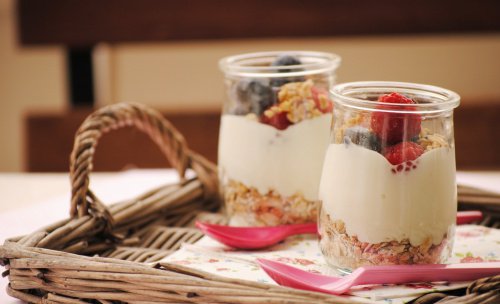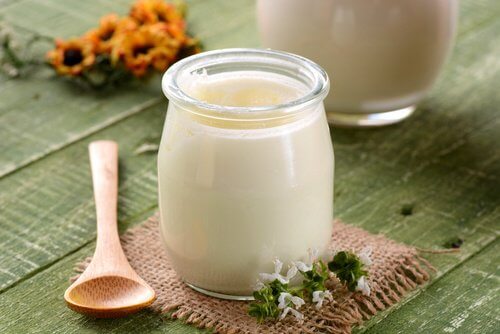Hypothyroidism: 7 Key for a Healthy and Adequate Breakfast


Written and verified by the doctor Maricela Jiménez López
Living with hypothyroidism isn’t easy. But it usually responds well to correct medical treatment. However, there is something not many patients may know: you need to change your dietary habits.
Any alteration in our thyroid gland generates a series of changes in our body that will force us to establish new routines, and of course, to eat healthier.
In the case of hypothyroidism, what happens is that there is a deficit of thyroid hormones. Thus, the organic activity that affects metabolic, neuronal, cardiocirculatory, and digestive functions changes, as confirmed by research carried out by the Journal of Clinical Endocrinology & Metabolism.
However, as we say, medical treatments are effective and patients can return to stabilize the activity of their thyroid gland.
Now, while we follow this pharmacological treatment… What nutritional strategies should we follow? Here are 5 guidelines for your breakfast.
Breakfasts for people with hypothyroidism
1. Say yes to natural beverages

The first aspect that nutritionists clarify for us regarding hypothyroidism is that we must eat a balanced diet.
That is, we know, for example, that increasing our doses of iodine will regulate our thyroid gland when it’s working at a low level.
However, you shouldn’t eat just foods containing this mineral. There’s no need to go to extremes.
- You must remember that coffee, as well as tea or soy, are not good for hypothyroidism. However, there are no conclusive studies about this.
- We must always run any change in our diet by a doctor.
What we really need to pay attention to in our diet are the benefits of fresh fruits and vegetables. Take note of these natural drinks that go well with breakfast.
- Natural carrot juice as per this study by the University of Agriculture in Krakow, Poland.
- Citrus infusion or smoothie, according to this research conducted by the Command Hospital, Lucknow, in Uttar Pradesh, India.
Discover: Sports and Exercise Tips for People with Hypothyroidism
2. Garlic
According to this information from Fundación Española del Corazón, garlic is very good for regulating your thyroid and treating hypothyroidism. This is because it’s rich in iodine and selenium, two minerals that are essential when you have this type of condition.
We recommend you consume it as follows:
- Spread two garlic cloves on whole-wheat toast.
- You can also make an omelet with garlic, as eggs are also good for you when you have hypothyroidism.
3. Oatmeal
There’s no study that supports oats as a recommended food for hypothyroidism. So, you must consult a doctor before adding it to your diet.
4. Whole grains
Whole grains provide the fiber that’s great for hypothyroidism, according to this study by Instituto Superior de Ciencias Médicas de Villa Clara (Serafín Ruiz de Zarate Ruiz) in Cuba.
However, there’s no scientific evidence to recommend it specifically to patients with hypothyroidism.
5. Natural organic yogurt

If you do not have any lactose intolerance, natural yogurt is a sensational proposal for your breakfasts, since it’s a probiotic very rich in iodine, according to this research carried out by the Spanish Nutrition Society.
Look for one that is organically made. However, if you know how to make them yourself, it will be much more beneficial.
6. Blueberries
Did you know that blueberries are natural treasures rich in antioxidants and are a powerful source of iodine?
- Try to eat them in season. Then, add to natural yogurt, or mix a spoonful of oatmeal, and you will have a wonderful option for breakfast.
7. Eggs
In a diet for people with hypothyroidism, a couple of eggs can also be included in the first meal. These are of high protein value both in the white and in the yolk and are part of any balanced diet.
Its properties include vitamins A, D, E, and K, antioxidant substances, and minerals such as iodine, iron, phosphorus, selenium, and zinc.
In conclusion
One way to start the day is by taking care of our thyroid glands with a good breakfast. These options we have suggested are very beneficial for cases of hypothyroidism.
However, keep in mind that physical activity also stimulates our metabolism according to this study by Universidad Central de Ecuador.
So, if you have time, after breakfast, go for a walk or practice yoga. You’ll feel more relaxed. As you can see, it’s worth a shot!
All cited sources were thoroughly reviewed by our team to ensure their quality, reliability, currency, and validity. The bibliography of this article was considered reliable and of academic or scientific accuracy.
- Aguilar Chasipanta, W. G., Barquin Zambrano, C. R., Jordán Sánchez, J. W., Espinoza Álvarez, E. I., Bayas Cano, A. G., & Vaca García, M. R. (2017). Efectos del deporte sobre la glándula tiroides. Revista Cubana de Investigaciones Biomédicas, 36(3), 1-13. https://www.researchgate.net/publication/323175980_Efectos_del_deporte_sobre_la_glandula_tiroides
- Bellastella, G., Scappaticcio, L., Caiazzo, F., Tomasuolo, M., Carotenuto, R., Caputo, M., Arena, S., Caruso, P., Maiorino, M. I., & Esposito, K. (2022). Mediterranean diet and thyroid: an interesting alliance. Nutrients, 14(9), 1-13. https://www.ncbi.nlm.nih.gov/pmc/articles/PMC9571437/
- British Thyroid Foundation. (s.f.). Thyroid and diet factsheet. Consultado el 12 de enero de 2024. https://www.btf-thyroid.org/thyroid-and-diet-factsheet
- Brito Campana, J. (3 de agosto de 2023). Soy: does it worsen your hypothyroidism? Clínica Mayo. Consultado el 12 de enero de 2024. https://www.mayoclinic.org/diseases-conditions/hypothyroidism/expert-answers/hyperthyroidism/faq-20058188
- Duntas, L. H. (2023). Nutrition and thyroid disease. Current Opinion in Endocrinology, Diabetes and Obesity, 30(6), 324-329. https://pubmed.ncbi.nlm.nih.gov/37578378/
- Mayo Clinic. (1 de enero de 2024). Levotiroxine (oral route) proper use. Consultado el 12 de enero de 2024. https://www.mayoclinic.org/drugs-supplements/levothyroxine-oral-route/proper-use/drg-20072133
- National Institutes of Diabetes and Digestive and Kidney Diseases. (Marzo de 2021). Hipotiroidismo (tiroides hipoactiva). Consultado el 11 de enero de 2024. https://www.niddk.nih.gov/health-information/informacion-de-la-salud/enfermedades-endocrinas/hipotiroidismo#whatis
- Wiesner, A., Gajewska, D., & Pasko, P. (2021). Levotiroxine interactions with food and dietary supplements – a systematic review. Pharmaceuticals, 14(3), 1-20. https://www.ncbi.nlm.nih.gov/pmc/articles/PMC8002057/
- Sharma, R., Bharti, S., & Hari Kumar, K. V. S. (2014). Diet and thyroid – myths and facts. Journal of Medical Nutrition and Nutraceuticals, 3(2), 60-65. https://www.jmnn.org/article.asp?issn=2278-1870%3Byear%3D2014%3Bvolume%3D3%3Bissue%3D2%3Bspage%3D60%3Bepage%3D65%3Baulast%3DSharma%3Baid%3DJMedNutrNutraceut_2014_3_2_60_131954;fbclid=IwAR2_kgomzYqXTz3MUpezC7bJ8p2nS-sajHu6LR6dzIv37dP9X7xyC9TLYJg
This text is provided for informational purposes only and does not replace consultation with a professional. If in doubt, consult your specialist.








